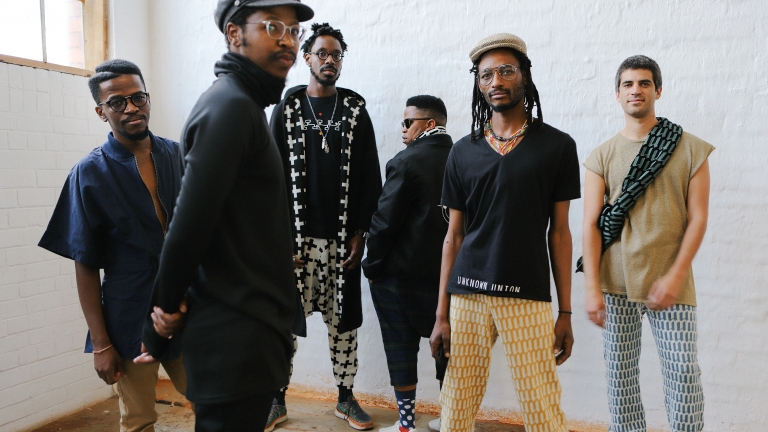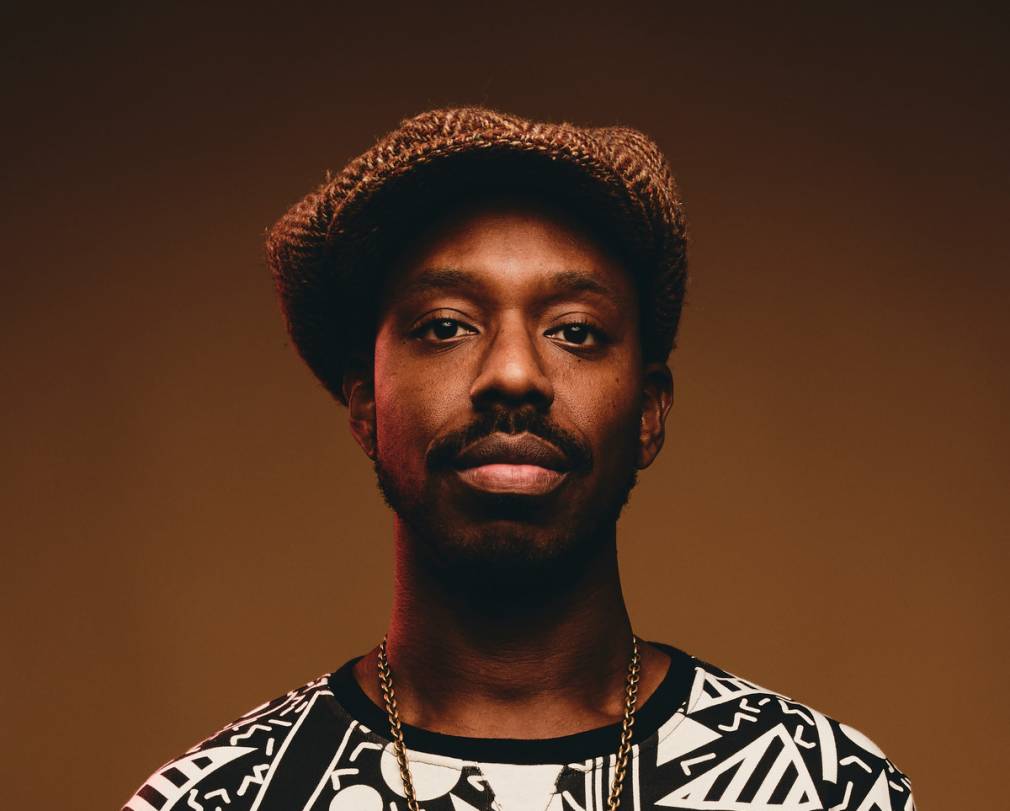The British-Barbadian jazz saxophonist Shabaka Hutchings is best known for his two previous works: Sons of Kemet and The Comet is Coming. Backed by his other band The Ancestors, Hutchings recently has put out a new album just before the lockdown announcement in the UK. In We Are Sent Here By History, the second album released along with this group, the Mercury Prize-nominated musician has been thinking about society as a whole, change, and endings. Conceptualized as a “sonic poem” with lyrics written by the Johannesburg-based artist and poet Siyabonga Mthembu, the record evokes traditions, colonization, western progress, species and the planet. A vibe that coincidentally resonates with our world’s current situation. PAM spoke with him about what changed in his life and career during this pandemic.
How are you and where are you holding up?
I’m in London, at home. It has progressed since the beginning. There has been a feeling of confusion at first, two weeks ago, I wondered: « What do I do with all of this time at home? » That’s a big change that happened for everyone. So I guess the first week I wasn’t doing that much, I was just trying to keep a basic amount of practice and to listen to music. But now I have kind of got my flow. I get up in the morning, I go for a walk around the block to get some air. I have a schedule of things that needs to be done. I think that’s how I made it through the last weeks… By making definite plans of things I want to achieve throughout this time. I’m trying to make the most of this time even though it is a bad situation.
What are your days made of?
There’s a new Sons of Kemet album that we finished recording a few months ago that is now in the production stage. We’re going through the songs we have, figuring out which ones we want to keep and what points we need to edit. I’ve also got a commission from the London Sinfonietta to write a classical piece that needs to be finished by the end of the year. Then there’s the personal practice obviously. There’s areas of practice I couldn’t work on while on tour which I now can focus on. I did a solo performance for Boiler Room recently, so I’ve been working on that too. And then I’m reading a bit more on philosophy and spirituality with this book titled The Metu Meter. The book is huge, so I never had a chance to really read it. So I’ve been doing that and writing notes about it. Without this frame of working, with loads of things to do, I think I would fall into this kind of slump of not knowing what my days are about since there is no gigs and that is what has dominated my time in this last few years.
So what are you listening to?
I’ve been listening to a lot of Sibusile Xaba, a guitar player from South Africa. In the same vein I’ve also been listening to Nduduzo Makhathini. Their latest release are very good. And also Alabaster dePlume… I’ve got lots of new music that I now take the time to listen to at loud volume and to process. It’s like I wanna recharge the music in my head. When you’re touring a lot you’re hearing so much loud sounds everyday, you just want to listen to the music you know, the one that makes you feel good but you don’t want to explore new music because you’re brain is exhausted. So I’m enjoying going through playlists and discovering the new things.
Can you tell me a bit about the release of your new album right before the corona crisis?
It was planned before the crisis happened. Even in the UK, the government was still acting like there was no problem a week before putting us on quarantine. The release of the album was the day were the government policy switched. In a way I like the idea that the people have the time to listen to it and digest it, let it sit with them before we get to play it live. There’s always this situation were you release an album and you go straight on the road and people have heard the album but it still sounds fresh when you play it. Now, when things will go back to normal, the people interested in the music will have lived it for a while and we, as a band, will have too. It will be a more communal atmosphere in the venues. There’s a kind of vibe that you have when the people know the music intuitively. It’s the difference between playing at the start and the end of a tour when the music is being passed around in public. There’s always a different kind of response.

Do you think this crisis is gonna change the live experience?
It’s gonna a be a long time before it all goes back to normal… It’s probably going to take at least 6 months. And it’s gonna take more for the public to trust that they can go into gigs without being affected. Even if the government says it’s ok to go to gigs again. I think there’s gonna be a big difference considering the time during which we haven’t been able to play for people. Last year I did a gig every three days. Something like 130 gigs in 10 months… On the year before it was basically the same. All I know is gigging… And all the sudden I’m able to actually sit down, reflect on what I like about music and to listen to it on speakers more than on headphones, which is a different kind of taking in music to me. I’m able to listen to more artists and I know everyone else is doing the same. When we get back to playing live music there’s gonna be a shift because everyone would have had this period of reflexion about what it’s all about. I think it’s not just the music. This major shift will affect the society. Like: what’s the point of everything? The point of everything before all this was security. Take for example the cliché parents tell their kids: don’t be a musician, that’s not stable. That idea of stability got undercut, we realized that nothing is that stable. So that allows people to pursue the thing that gives them the most fulfillment and that can sustain them in a more wholesome way so that if something like this happens again at least they can say they’re doing what they love. No one can continue having the same attitude and the same jobs they had before. Also I think it’s gonna be a big shift out of the metropole cities because: why would you wanna come to London and be a slave with a low paid job that means that when there’s some kind of crisis you’re in an absolute destitute state. There’s gonna ba a shift to more provincial areas, away from the big centers. And that will probably affect where we tour and what our approach to playing to people is.
Can you tell me a bit about the changes about society that this new album suggests?
There’s different changes throughout the album. That’s the reason we made it into different short poems, it’s almost like giving a snapshot, a direction to think and then space to consider. Hopefully everyone has their own narrative and that narrative can shift and everyone within the band has their own idea about the change it implies. To me, one of the changes is the way we look at western progress. The word « savage » has been used to talk about people who aren’t from the western world. It demeaned them. But if we think about it we can’t sustain ourselves within the western world. And those societies, communities that have been called uncivilized, they’re the one who would have lived in harmony with nature, who are sustainable. The progress is flawed. It’s time to go back to those ideas that have been disqualified before.
Are you optimistic about the future?
I’m optimistic with the knowledge that there is a small and a bigger picture. Considering the time that we’re now in I’m pessimistic about the state of the music industry and even of society in the short term. But I’m optimistic about the bigger picture. I think we’re gonna find ways to move forward.
Some say this is a warning of nature, what do you think?
I don’t think it’s a warning of nature, the virus spread because of human fuck ups. And that also has to do with the arrogance of the governors. If the Chinese had taken the warnings of doctors seriously and alerted the world at the beginning… We wouldn’t be here. If all the governments had been taking it seriously… We wouldn’t be here. I’ve been following this before it was perceived by the general public as a real threat. Anyone that was reading a tiny bit of international affairs at the time knew about it. It felt like this thing was coming to us but we were dumbasses… It’s a matter of man’s nature fulfilling its logical course. The arrogance from the western world comes from the colonial history. They seem to think that what affects the world doesn’t affect them because of some kind of superiority… Sure, it will be good for nature to have this chance to breathe a little bit. But it wouldn’t have to if we didn’t fuck it up in the first place. Let’s just see how this goes.
What will you do first when this all is behind us?
Good question. Hard one actually… (Hesitating) The reason it’s so tough is that my life isn’t that different than if I was at home on a break and had all this work to do anyway. I’m just at home practicing, listening to music… I guess it’s just the gigs that I miss. Everything is as it would be except I’m not going back on tour next week. Also when I’m at home I practice really quietly, which is good technically speaking and I have neighbors but it’s gonna be so good to finally be able to blow my instrument as loud as possible.
